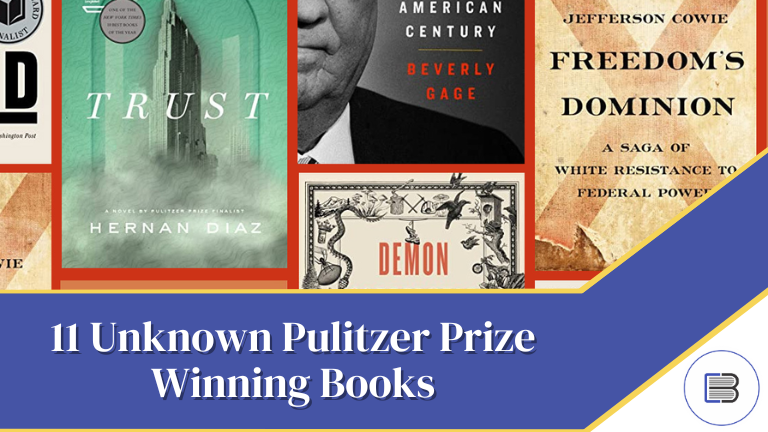Sure, The Road and To Kill a Mockingbird get all the spotlight—but believe it or not, the Pulitzer Prize has gone to a few books you haven’t seen on every tote bag and Instagram flat lay.
Hidden among the literary giants are some seriously underrated reads: quieter, weirder, or just forgotten over time.
So if you’re in the mood to read like a book snob without actually being one, here are 11 lesser-known Pulitzer Prize-winning novels that deserve a little extra shelf space.
11. His Family by Ernest Poole (1917)
His Family is a quiet domestic drama set in New York City just before World War I. It follows Roger Gale, a widower, and his three daughters as they struggle to adapt to rapidly changing social conditions in the 1910s. Each daughter represents a different response to modern life – from social reform to pursuit of luxury – forcing Roger to confront new ideas and generational conflicts within his family. Published in 1917, this novel became the first ever to win the Pulitzer Prize for fiction. His Family offers readers a sympathetic look at family dynamics amid the upheavals of early 20th-century urban America.
10. Now in November by Josephine W. Johnson (1934)
Set during the Dust Bowl and Great Depression, Now in November portrays a once-comfortable Midwestern family struggling to survive on a failing farm. Narrated by 13-year-old Marget, the story spans years of drought and hardship as her parents and two sisters contend with poverty and personal tensions on their mortgaged land. Johnson’s prose paints an atmosphere of growing despair and “hopelessness [that] slowly begins to bleed into everything,” conveying the crushing weight of environmental catastrophe and economic ruin. Remarkably, this debut novel earned the 24-year-old Johnson the Pulitzer, making her the youngest-ever winner of the award. It’s a powerful, lyrical portrayal of resilience and disillusionment.
9. Honey in the Horn by H. L. Davis (1935)
Honey in the Horn is a coming-of-age tale set on the Oregon frontier in the early 1900s. It follows orphaned teenager Clay Calvert as he journeys across Oregon — from coastal farms to high desert — encountering homesteaders, horse traders, outlaws, and dreamers along the way. Through Clay’s adventures, the novel vividly depicts the challenges of early settler life and the harsh beauty of the Pacific Northwest. Davis, a native Oregonian, richly illustrates how the land shapes its people. Winner of the 1936 Pulitzer, Honey in the Horn is a Western with literary flair, offering a rare glimpse into Oregon’s past.
8. Guard of Honor by James Gould Cozzens (1948)
Guard of Honor is a sprawling World War II-era novel that unfolds over three tense days on a U.S. Army Air Force base in Florida. Rather than focusing on combat, Cozzens centers the story on escalating tensions after a racial integration experiment is introduced. The novel explores the military bureaucracy, moral conflicts, and interpersonal politics of the base’s officers as they grapple with duty, discrimination, and decorum. With meticulous detail and insight, Cozzens captures the emotional and ethical complexity of leadership during wartime. It’s a sharp, slow-burn look at the home front that earned the 1949 Pulitzer Prize.
7. Andersonville by MacKinlay Kantor (1955)
Andersonville is an epic historical novel about the infamous Confederate prison camp in Georgia where thousands of Union soldiers were held during the Civil War. Told from multiple perspectives, the novel depicts the harrowing conditions inside the camp and the moral decay surrounding it. Kantor doesn’t shy away from the brutal details, drawing haunting parallels between Andersonville and later concentration camps. The story also reaches beyond the prison walls, revealing the lives of townspeople and the prisoners’ families. Winner of the 1956 Pulitzer, Andersonville is a massive, sobering meditation on war, cruelty, and endurance.
6. The Keepers of the House by Shirley Ann Grau (1964)
Set in a small Alabama town, this multigenerational Southern saga follows the Howland family and the explosive secret at the heart of their legacy. When it’s revealed that the late white patriarch had a long relationship—and children—with his Black housekeeper, the family’s social standing unravels. Told with quiet intensity, the novel examines racism, class, and hypocrisy in the American South. Grau’s elegant prose delivers a powerful critique of the times, and the backlash she received for writing it (including threats from the KKK) speaks volumes. The Keepers of the House won the 1965 Pulitzer for its bravery and resonance.
5. Elbow Room by James Alan McPherson (1977)
Elbow Room is a vibrant and varied collection of short stories exploring African American life in 1970s America. McPherson mixes satire, drama, and introspection to portray characters navigating identity, justice, and societal expectations. From barbershops and courtrooms to jazz bars and church halls, these stories capture the everyday moments and moral crossroads that define a life. With a light touch and deep compassion, McPherson became the first Black writer to win the Pulitzer for fiction. Elbow Room is rich in empathy and insight—subtle, smart, and still incredibly relevant.
4. A Summons to Memphis by Peter Taylor (1986)
In this Southern tale of family tension, middle-aged Phillip Carver returns home to Memphis to intervene in his aging father’s unexpected engagement. The visit forces him to unpack decades of unresolved resentment, particularly over a move the family made during the Depression that shattered their lives. Taylor’s story is a study in restraint—both in its genteel prose and in its exploration of the complex emotions tethered to family, duty, and the past. This 1987 Pulitzer winner quietly devastates as it reveals how old wounds fester when left unspoken.
3. Martin Dressler: The Tale of an American Dreamer by Steven Millhauser (1996)
A surreal and whimsical Gilded Age fable, Martin Dressler follows an ambitious young entrepreneur who rises from cigar clerk to hotel magnate in early 20th-century New York. Martin’s dreams grow ever more elaborate and fantastical—culminating in a hotel that’s practically a self-contained city. Millhauser’s prose is lush and mesmerizing, his vision of ambition both intoxicating and cautionary. Beneath the glittering facade is a man always chasing the next idea, never quite fulfilled. Winner of the 1997 Pulitzer, this is a strange and beautiful meditation on success and the illusions we build.
2. The Known World by Edward P. Jones (2003)
This stunning novel explores a little-known truth of antebellum America: the existence of Black slaveowners. The central character, Henry Townsend, is a former slave who becomes a plantation owner himself. Through multiple characters and timelines, Jones creates a rich tapestry of lives connected by a morally corrupt system. The novel’s structure is sprawling, but every thread reveals the psychological and social damage slavery inflicts on all who touch it. The Known World won the 2004 Pulitzer for its originality, ambition, and emotional depth—it’s a masterclass in historical fiction.
1. Tinkers by Paul Harding (2009)
Tinkers is a quiet, poetic novel about memory, time, and mortality. As clock repairman George Crosby lies on his deathbed, his thoughts drift to his father—an epileptic traveling peddler—and the lives of men whose work ticked in rhythm with the natural world. The novel is nonlinear, almost hallucinatory, filled with luminous details about timepieces, nature, and fleeting moments of human connection. This slim debut came from a small press and unexpectedly won the 2010 Pulitzer. Tinkers is a slow, meditative read—perfect for fans of lyrical, introspective fiction.

![His Family [Book]](https://m.media-amazon.com/images/I/81Tspu8OVAL.jpg)









![Tinkers [Book]](https://m.media-amazon.com/images/I/71PApv4YW+L.jpg)


